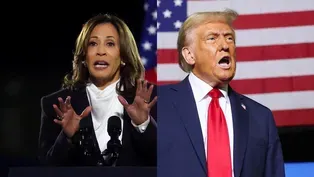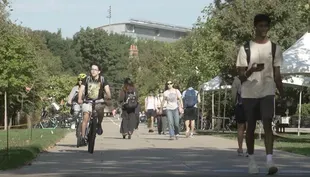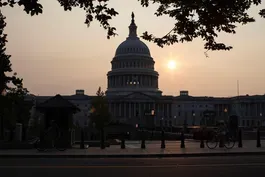
A look at Harris’ and Trump’s positions on healthcare policy
Clip: 10/30/2024 | 6m 40sVideo has Closed Captions
A look at Harris’ and Trump’s positions on healthcare policy
With less than a week until election day, Kamala Harris and Donald Trump are making their final case to voters, laying out starkly different visions on a number of key issues. White House Correspondent Laura Barrón-López takes a deep dive into the candidates' positions on health care.
Problems with Closed Captions? Closed Captioning Feedback
Problems with Closed Captions? Closed Captioning Feedback
Major corporate funding for the PBS News Hour is provided by BDO, BNSF, Consumer Cellular, American Cruise Lines, and Raymond James. Funding for the PBS NewsHour Weekend is provided by...

A look at Harris’ and Trump’s positions on healthcare policy
Clip: 10/30/2024 | 6m 40sVideo has Closed Captions
With less than a week until election day, Kamala Harris and Donald Trump are making their final case to voters, laying out starkly different visions on a number of key issues. White House Correspondent Laura Barrón-López takes a deep dive into the candidates' positions on health care.
Problems with Closed Captions? Closed Captioning Feedback
How to Watch PBS News Hour
PBS News Hour is available to stream on pbs.org and the free PBS App, available on iPhone, Apple TV, Android TV, Android smartphones, Amazon Fire TV, Amazon Fire Tablet, Roku, Samsung Smart TV, and Vizio.
Providing Support for PBS.org
Learn Moreabout PBS online sponsorshipAMNA NAWAZ: With less than a week until Election Day, Kamala Harris and Donald Trump are making their final case to voters, laying out starkly different visions on a number of key issues.
That includes health care.
Our White House government, Laura Barron-Lopez, has been covering this as part of our ongoing deep dive into the candidates' Promises and Policies this election.
Good to see you, Laura.
LAURA BARRON-LOPEZ: Good to be here.
AMNA NAWAZ: So you reported recently about the candidates' approach on abortion access and reproductive rights.
There's a lot more to talk about, broader with health care policy.
So let's start with Vice President Harris.
What are her key plans on health care?
LAURA BARRON-LOPEZ: Some of Harris' big health care policy proposals are to build on the Inflation Reduction Act, cancel more medical debt, renew the Affordable Care Act subsidies that are expiring in 2025, and expand access to birth control pills.
Now, Amna, when it comes to the Inflation Reduction Act, she wants to expand that $35 cap on insulin that she and Biden passed for Medicare recipient.
She wants to expand that to all Americans.
She also wants to cap every American's prescription drug costs at $2,000 a year.
Currently, it only applies to Medicare recipients.
And, recently, Harris proposed that there should be an at-home care benefit covered by Medicare.
KAMALA HARRIS, Vice President of the United States (D) and U.S. Presidential Candidate: Currently, if you need home care and you don't have some money to hire someone, you and your family need to deplete your savings to qualify for help.
That's just not right.
So, we're going to change the approach and allow Medicare to cover the cost of home care... (CHEERING) KAMALA HARRIS: ... so seniors can get the health and care they need in their own homes.
LAURA BARRON-LOPEZ: That home care benefit, Amna, would also cover people with disabilities that are on Medicare.
And policy experts that we talked to said that could end up covering millions of seniors.
AMNA NAWAZ: So those are the plans we have heard from Vice President Harris.
How do those differ from the plans we have heard from former President Trump?
LAURA BARRON-LOPEZ: Some of Donald Trump's top health care positions are to repeal and replace the Affordable Care Act.
He also wants to lower health care insurance premiums, but doesn't have details on how he'd do that.
He has been silent on protecting Medicaid and he also wants to institute an anti-vaccine mandate for public schools.
Now, recently, Donald Trump also said that he would put Robert F. Kennedy Jr., a staunch anti-vaxxer, in charge of health care policy.
DONALD TRUMP, Former President of the United States (R) and Current U.S. Presidential Candidate: Robert F. Kennedy cares more about human beings and health and the environment than anybody.
(CHEERING) DONALD TRUMP: I'm going to let him go wild on health.
I'm going to let him go wild on the food.
I'm going to let him go wild on medicines.
(CHEERING) LAURA BARRON-LOPEZ: Health experts on the say that appointing someone like RFK Jr. to potentially lead Health and Human Services, to lead the Centers for Disease Control could end up spreading more public health disinformation, because he has been known to do that.
On that Medicaid front, Amna, Trump has said that he wants to reduce federal government spending and he wants to cut taxes and that he doesn't want to touch Social Security or Medicare to do it.
So, health experts are concerned that means there's going to be a big target on Medicaid.
AMNA NAWAZ: So those are the plans, that they have been laying them out.
You have also looked at their health care policies.
How do their outlooks differ on this?
LAURA BARRON-LOPEZ: Well, a lot of it comes down to the Affordable Care Act, which currently covers 21 million Americans.
Donald Trump tried to repeal it in 2017 without much of a replacement plan when he was president.
It didn't work.
And seven years later, he says now that he has -- quote -- "concepts of a plan" to replace it.
His running mate, J.D.
Vance, has filled in some of those concepts.
J.D.
Vance has floated repealing a mandate within the ACA that requires insurance -- insurers to cover people with preexisting conditions.
And if Trump and Vance were successful in repealing that mandate, Larry Levitt, vice president of health policy at KFF, said it would have a huge impact on sick Americans.
LARRY LEVITT, Executive Vice President For Health Policy, KFF: If you start segregating people into different pools, that leaves people with preexisting conditions at risk.
I mean, we know what insurers do when they're not required to cover people with preexisting conditions or charge them the same premiums as healthy people.
They exclude them from insurance.
LAURA BARRON-LOPEZ: Bottom line, Larry Levitt said, is that, under Trump, young and currently healthy people would receive lower premium costs, but sick and people -- sick people and people with preexisting conditions would end up not being covered by insurers.
And also this week, we should note, Amna, that House Speaker Mike Johnson agreed that there should be no Obamacare, multiple outlets have reported, according to some leaked video.
Now, the difference between him, Donald Trump, and his proposals, and Harris when it comes to the Affordable Care Act is that she wants to expand on what is already in place.
The issue, though, Amna, is that many of her policies rely on favorable numbers in Congress.
And it's looking like the Senate may flip to Republicans and Democrats may control the House.
So being able to expand on subsidies that are already in the Affordable Care Act could be difficult for Harris to do.
AMNA NAWAZ: I know the experts you have been talking to have been digging into these plans, running the numbers, examining them.
What did they tell you would be the overarching impact of these proposals?
LAURA BARRON-LOPEZ: Experts like Larry Levitt say that, ultimately, both candidates appear to approach health care as an economic issue.
But the big difference is who they're trying to save money for.
LARRY LEVITT: Trump has focused particularly in his comments around the Affordable Care Act on government spending, on making programs less expensive for the federal government.
And Harris, we have seen a focus on health care as everyday pocketbook issues, so whether that's improving premium subsidies under the Affordable Care Act and lowering the premiums people pay out of pocket and trying to relieve medical debt.
LAURA BARRON-LOPEZ: Those expanded Affordable Care Act subsidies that Larry was talking about there, they expanded the number of people who qualified for financial assistance and the amount of help that they receive.
And they're set to expire in 2025.
Harris says she wants to extend them.
But if they expire under a Donald Trump presidency, it could have a huge burden on everyday Americans.
AMNA NAWAZ: All right, Laura Barron-Lopez, thank you very much.
LAURA BARRON-LOPEZ: Thank you.
Americans in Ukraine on how election could change war
Video has Closed Captions
American volunteers fighting in Ukraine share views on how election could affect the war (7m 8s)
Harris, Trump campaign in N.C. with less than a week to go
Video has Closed Captions
Harris and Trump swing through North Carolina with less than a week of campaigning left (5m 8s)
How a college degree is one of the best voter predictors
Video has Closed Captions
How a college degree is one of the best predictors of which candidate voters support (10m 3s)
New airline refund rules could ease travel hassles
Video has Closed Captions
New airline refund rules could ease travel hassles for American passengers (4m 32s)
'Purpletown' documents what people still have in common
Video has Closed Captions
'Purpletown' documents what people in politically divided areas still have in common (4m 51s)
Races that will determine the balance of power in Congress
Video has Closed Captions
Pivotal races that will determine the balance of power in Congress (6m 6s)
Providing Support for PBS.org
Learn Moreabout PBS online sponsorshipMajor corporate funding for the PBS News Hour is provided by BDO, BNSF, Consumer Cellular, American Cruise Lines, and Raymond James. Funding for the PBS NewsHour Weekend is provided by...

















